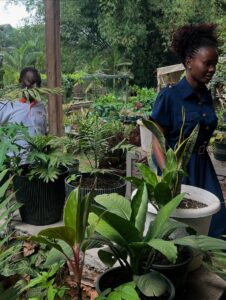By Immaculate Kisembo
Mental health is a critical yet often overlooked aspect of overall well-being, among the youth in Uganda and elsewhere. As a matter of fact many young people in Uganda are silently struggling with anxiety, stress, and depression, often caused by academic pressure, environmental issues including poverty, or family-related expectations put on them. The same youth are struggling to cope up with the fast paced digital world where social media is used by some to define personality and social status. I think this is where I come in to call upon families, and institutions of learning to give young people time to form meaningful interpersonal connections with families to form good social connections and friendships within the family and institutions to engage learners in bonding hands on activities and programs. I have been working with my students on creative sustainability projects. I have seen how much they have empowered learners with concrete social and communication skills thus behavior change that comes with creative thinking and addressing social challenges which requires open dialogue, education, and accessible support systems.
The Silent Struggles of Uganda’s Youth
My recent studies on data analytics indicate that approximately 20% of adolescents in Uganda experience mental health challenges, yet only a small fraction receive the necessary support (Kisembo, 2025). Factors contributing to these issues include academic stress, poverty, and family expectations. For instance, a report by the Daily Monitor revealed that stress due to poor performance accounts for 44% of mental health cases among secondary school learners (Owiny, 2024). Additionally, family-related issues, such as domestic violence, contribute to 26% of cases, while bullying accounts for 22% (Owiny, 2024).
The Role of Educational Institutions
Educational institutions play a pivotal role in shaping the mental health of students. When schools prioritize mental health, they can create an environment where students feel understood and cared for, ultimately leading to improved outcomes. Integrating mental health education into the school curriculum can help reduce stigma and encourage open conversations. For instance, the Uganda Ministry of Education and Sports has initiated various programs aimed at promoting mental well-being among students, emphasizing the importance of peer support and counseling services (Ministry of Education and Sports, 2022). But how many of our institutions are taking this seriously? Remains a question to ponder.
Moreover, providing access to trained mental health professionals within schools is vital. My recent Research indicates that when students have access to counselors or psychologists, they are more likely to seek help and discuss their challenges (Kibira et al., 2020). Schools such as St. Mary’s College Kisubi and Holy Cross Lake View have successfully integrated mental health services, offering students a safe space to express their feelings and concerns (Kisembo, 2025).
Community Engagement and Peer Support
Community involvement is essential in fostering a supportive environment for students. Engaging parents and guardians in mental health awareness initiatives can create a holistic support system for students. Programs that encourage family participation, such as workshops and seminars, can equip parents with the tools to understand and support their children’s mental health needs (Kiggundu, 2023).
Peer support has also proven effective in addressing youth mental health issues. The Youth Mental Health Project, implemented by Mental Health Uganda in partnership with SOS Children’s Villages Uganda, trains ‘Mental Health Champions’—students who lead mental health awareness activities and provide peer support (Mental Health Uganda, 2023). These champions create safe spaces where young people can discuss sensitive issues and seek help from peers I do appreciate something in the Laudato Si Clubs Models by the Laudato Youth Initiative where young people are taught to work with mentors who guide them and encourage them to listen to each other and dialogue over issues for concrete solutions that involve their voice and opinions.
The Laudato Youth Initiative’s Contribution
I will be happy to say that the Laudato Youth Initiative (LYI) has been actively involved in advocating for mental health awareness among youth in Uganda. Through various programs and campaigns, LYI aims to integrate mental health education into climate action efforts, recognizing the interconnectedness of environmental and mental well-being (Kisembo, 2025). LYI utilizes various media platforms such as social media campaigns, podcasts, videos, and webinars to educate and engage young people about climate change and mental health (Kisembo, 2025).
To support Uganda’s youth in living healthier, happier lives, it is imperative to:
- Integrate Mental Health Education: Incorporate mental health topics into school curricula to promote understanding and reduce stigma.
- Provide Access to Support Services: Ensure that schools have trained mental health professionals available to assist students.
- Engage Communities: Involve parents and community members in mental health awareness initiatives.
- Empower Peer Support: Train students to become ‘Mental Health Champions’ who can lead awareness activities and provide support to their peers.
- Advocate for Policy Change: Encourage policymakers to prioritize mental health in educational and community settings.
By taking these steps, Uganda can create a supportive environment where young people feel understood and empowered to thrive.
References
Kibira, S. P., et al. (2020). The Role of School-Based Mental Health Services in Uganda. Journal of Mental Health Policy and Economics.
Kiggundu, E. (2023). Family Engagement in Mental Health: A Study from Uganda. African Journal of Educational Studies.
Kisembo, I. (2025). Mental Health Support in Educational Institutions. Laudato Youth Initiative. Retrieved from https://laudato-youthinitiative.org/2025/02/24/mental-health-support-in-educational-institutions/
Mental Health Uganda. (2023). The Youth Mental Health Project. Retrieved from https://www.mentalhealthuganda.org/the-youth-mental-health-project-2/
Ministry of Education and Sports. (2022). National Policy on Mental Health in Education. Kampala: Government of Uganda.
Owiny, T. J. (2024). Poor performance stress fuels mental health crisis in schools. Daily Monitor. Retrieved from https://www.monitor.co.ug/uganda/news/national/poor-performance-stress-fuels-mental-health-crisis-in-schools-4907008
World Health Organization. (2021). Mental Health in Adolescents: A Global Perspective. Geneva: WHO.














